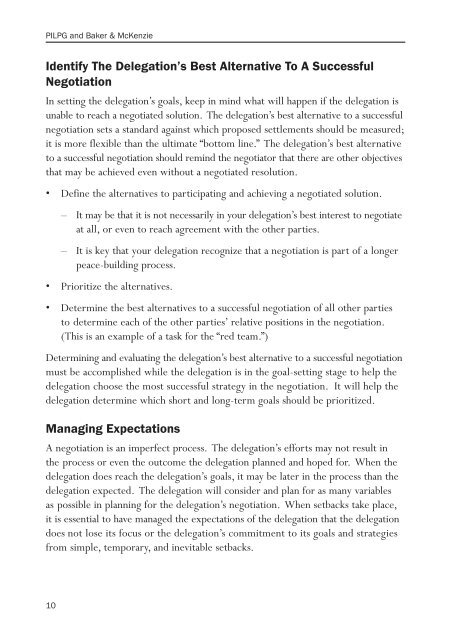The International Negotiations Handbook - Baker & McKenzie
The International Negotiations Handbook - Baker & McKenzie
The International Negotiations Handbook - Baker & McKenzie
You also want an ePaper? Increase the reach of your titles
YUMPU automatically turns print PDFs into web optimized ePapers that Google loves.
PILPG and <strong>Baker</strong> & <strong>McKenzie</strong><br />
Identify <strong>The</strong> Delegation’s Best Alternative To A Successful<br />
Negotiation<br />
In setting the delegation’s goals, keep in mind what will happen if the delegation is<br />
unable to reach a negotiated solution. <strong>The</strong> delegation’s best alternative to a successful<br />
negotiation sets a standard against which proposed settlements should be measured;<br />
it is more flexible than the ultimate “bottom line.” <strong>The</strong> delegation’s best alternative<br />
to a successful negotiation should remind the negotiator that there are other objectives<br />
that may be achieved even without a negotiated resolution.<br />
• Define the alternatives to participating and achieving a negotiated solution.<br />
– It may be that it is not necessarily in your delegation’s best interest to negotiate<br />
at all, or even to reach agreement with the other parties.<br />
– It is key that your delegation recognize that a negotiation is part of a longer<br />
peace-building process.<br />
• Prioritize the alternatives.<br />
• Determine the best alternatives to a successful negotiation of all other parties<br />
to determine each of the other parties’ relative positions in the negotiation.<br />
(This is an example of a task for the “red team.”)<br />
Determining and evaluating the delegation’s best alternative to a successful negotiation<br />
must be accomplished while the delegation is in the goal-setting stage to help the<br />
delegation choose the most successful strategy in the negotiation. It will help the<br />
delegation determine which short and long-term goals should be prioritized.<br />
Managing Expectations<br />
A negotiation is an imperfect process. <strong>The</strong> delegation’s efforts may not result in<br />
the process or even the outcome the delegation planned and hoped for. When the<br />
delegation does reach the delegation’s goals, it may be later in the process than the<br />
delegation expected. <strong>The</strong> delegation will consider and plan for as many variables<br />
as possible in planning for the delegation’s negotiation. When setbacks take place,<br />
it is essential to have managed the expectations of the delegation that the delegation<br />
does not lose its focus or the delegation’s commitment to its goals and strategies<br />
from simple, temporary, and inevitable setbacks.<br />
10

















